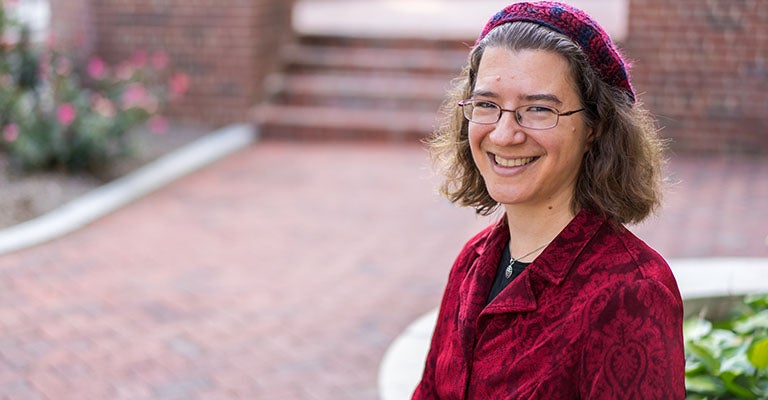College Establishes Minor in Disability Studies

Professor Julia Watts Belser of the Department of Theology taught a class in the Disability Studies Course Cluster, which began its first year as a minor this fall. (Photo: Alex Hu/Georgetown College)
October 3, 2017 — Charlotte Hine (B’19) grew up with friends and relatives with disabilities, so she’s always been invested in making sure people understand what disability really means.
“One in five people in the United States has some kind of disability,” she said. “It crosses social, racial, and economic divisions, and it can impact you at any point in your life.”
Now, Hine can engage with the concept of disability in a classroom. Thanks in large part to a wave of student activism, Georgetown has become the country’s first Jesuit university to establish an academic minor in disability studies.
Disability studies is a field in which disability is critically analyzed from a wide variety of academic disciplines. Scholars in the field ask questions ranging from the fundamental — how do we define disability? — to the incredibly specific — what are the ethical concerns surrounding medical intervention to prevent certain disabilities?
The College was already home to an impressive roster of faculty members who approached the subject from a range of perspectives, via the Disability Studies Course Cluster. Professor Jennifer Natalya Fink, for example, studies disabled art and performance, while Professor Julia Watts Belser examines the role of disability in religious texts.
The course cluster showed that a core of quality scholarship was present. All it needed was a demonstration of student interest.
“We had the courses, we had the professors, and we had the curriculum. Why did we still not recognize the hard work of our peers formally through a minor?” said Dani Zamalin (C’18), who got involved with disability activism through the Georgetown University Student Association and quickly became a leader in the student movement. “The [GUSA] Accessibility team used social media, tabling around campus, door-to-door visits, and countless other techniques to gather the voices and numbers to show Georgetown that this was necessary and desired by its students, faculty, and administrative members.”
The course cluster designation made it easy to search for classes tied in with disability studies, but the establishment of an official Program in Disability Studies goes much further in legitimizing the coursework.
Students can now apply for the six-course minor, which will appear on academic transcripts. The minor consists of one introductory class all participants must take, three of the eight disability-focused core courses, and two of the 10 electives that touch on disability in some form.
“The creation of the minor gives Georgetown students the potential to see how the world has been designed to exclude people with disabilities, from a person who may use a wheelchair to a person with atypical cognitive functioning,” said Stephanie Griffith (C’19), who worked on the minor petition as a member of the GUSA Accessibility team.
“We are a Jesuit institution, priding ourselves on a dedication to social justice and service to others,” added Zamalin. “It has been a turbulent year on campus and otherwise. We must look at our nation and our leadership and ask ourselves, ‘Do we want to make the same mistakes? Or do we want to be the pioneers who pave the road to a brighter, less violently hateful, future?’”
Zamalin, Griffith, and many other students involved in the movement to establish the minor won’t be able to take it themselves, simply because there isn’t room in their schedules to add another six courses before graduation. But some, like Hine, are taking the classes anyway.
An Entrepreneurship Fellow in the McDonough School of Business, Hine hopes to apply some of the lessons from her Introduction to Disability Studies class to an upcoming project: a book about disability and innovation in entrepreneurship. She sees the class as a unique opportunity for the intersection of different disciplines to drive creative thought.
“You can look at disability studies from any point of view, and it overlaps with almost anything you can study at Georgetown — business, design, healthcare, humanities, political perspectives,” Hine said. “I really appreciate that dialogue.”
The Program in Disability Studies invites students interested in the minor to an open house in New North 4 this Wednesday at 5 p.m. To learn more about the minor application process, visit the program’s page.
— Patrick Curran